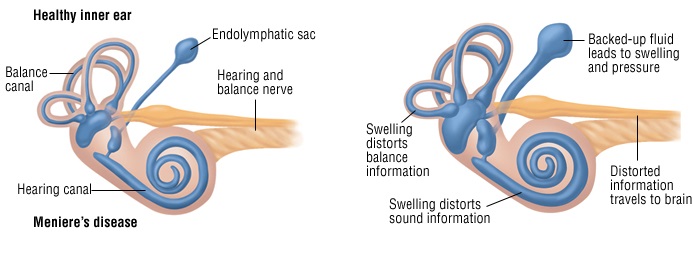Meniere’s disease is a vestibular disorder usually presenting in adults 30 to 50 years of age. The classic syptoms are episodic vertigo, low-pitched tinnitus, fluctuating low-frequency sensorineural hearing loss (SNHL) and a feeling of fullness in the affected ear. The vertigo is intense for 1 to 2 hours, followed by unsteadiness for a few days. The hearing loss and tinnitus usually resolve after an attack but may increase with each episode and the vertigo may persist. Drop attacks (“crisis of Tumarkin”), during which the patient loses extensor tension and falls to the ground fully conscious, may occur late in the disease. The causes of Meniere’s disease is unknown, but autoimmunity, endocrine disorder and disturbed labyrinthine electrolyte balance are suspected. The diagnosis is made by the history because the physical examination is normal except during an attack. Audiometry shows low-frequency SNHL and ENG shows hypoactivity on the effected side.
You should consult an otolaryngologist who will ask questions about your symptoms and ask you to describe what happens when you have an attack. Some tests might include hearing and blood tests, an MRI or CT scan, or special tests that check your balance and how well your ears work.
The treatment begins with eating a low-salt diet, avoiding tobacco and caffeine and taking diuretic. Vestibular suppressants are needed only during an acute attack. If medical treatment fails, surgery (e.g., endolymphatic shunt, vestibular nerve section, labyrinthectomy) may help. Chemical destruction of the vestibular system with transtympanic aminoglycosides has succeeded in controlling vertigo in some patients.
Meniere’s disease is often frustrating for people who have it. You may have to change the way you live to control the attacks. You should follow your doctor’s advice about your diet, and about cutting out alcohol, caffeine and smoking. Since stress may cause an attack, you may have to find ways to limit the stress in your life or learn how to deal with stress more effectively. Let your family, friends and co-workers know about the disease. Tell them how they can help you if you have an attack.

